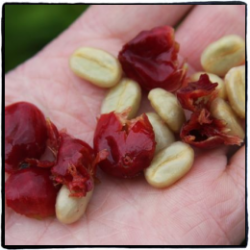Coffee Knowledge Natural Decaf Coffee Laurina

There are always some people who can't accept caffeine for various reasons, but like the aroma and taste of coffee. Therefore, in the past, we used manual treatment (such as Swiss water treatment) to remove caffeine from coffee beans as much as possible. The level of artificially processed decaf coffee has been improving, but there will always be people who think that its flavor will be worse than it was before caffeine was removed.
Scientists have also been trying to find ways to make the coffee fruit on the tree naturally decaf. In 1989, a team led by Mr. Andrea Illy, the third-generation head of Illy, a famous Italian coffee roaster, bought a batch of 185000 coffee saplings that an American company planned to throw away. In these seedlings, they found some natural varieties of bourbon species. The coffee fruit of this variety contains much less caffeine than ordinary Arabica coffee. The Illy team selected 15 sturdy "mother trees" from these seedlings for breeding and reproduction. El Salvador introduced this variety for experimental cultivation in 2000 and is now extended to other coffee-producing countries such as Costa Rica and Colombia. This breed is today's Laurina.
At the same time as the Illy team cultivated this variety, Japanese coffee company UCC and French scientists are also collaborating on the breeding of natural low-caffeine coffee. They selected a bourbon variety almost the same as Laurina in Madagascar and named it Bourbon Pointu.
In recent years, in Brazil and many other countries, there are also small companies or individuals trying to cultivate natural low-caffeine coffee varieties.
At an auction early this morning, a batch of 23-pound Laurina coffee and raw beans from Colombia sold for more than $100 a pound. It is believed that this price will stimulate a group of coffee farmers' interest in growing natural decaf coffee.
Important Notice :
前街咖啡 FrontStreet Coffee has moved to new addredd:
FrontStreet Coffee Address: 315,Donghua East Road,GuangZhou
Tel:020 38364473
- Prev

Stephen Diedrich talks about coffee roasting
Stephen Diedrich is the founder and president of the American Diedrich coffee roaster manufacturing company. Taking advantage of the opportunity that Viti invited him to Taiwan to participate in the coffee exhibition, I first conducted an in-depth interview with him for more than two hours on behalf of Coffee ti magazine on November 25th. Stephen talked eloquently about his entrepreneurial process, the concept of designing the roaster and the mental calendar of his development.
- Next

How to distinguish cappuccino from latte
First of all, I want to talk about the difference between Latte and Cappuccino. The only difference between them is the thickness of the top layer of milk foam. Cappuccino's milk foam is much thicker than Latte. Thick here does not mean Cappuccino's milk foam is harder than Latte. If you drink Cappuccino, the milk foam on top is dry and hard and the lumps are not dense, it can only mean that this is a cup of unqualified milk.
Related
- Beginners will see the "Coffee pull flower" guide!
- What is the difference between ice blog purified milk and ordinary milk coffee?
- Why is the Philippines the largest producer of crops in Liberia?
- For coffee extraction, should the fine powder be retained?
- How does extracted espresso fill pressed powder? How much strength does it take to press the powder?
- How to make jasmine cold extract coffee? Is the jasmine + latte good?
- Will this little toy really make the coffee taste better? How does Lily Drip affect coffee extraction?
- Will the action of slapping the filter cup also affect coffee extraction?
- What's the difference between powder-to-water ratio and powder-to-liquid ratio?
- What is the Ethiopian local species? What does it have to do with Heirloom native species?

